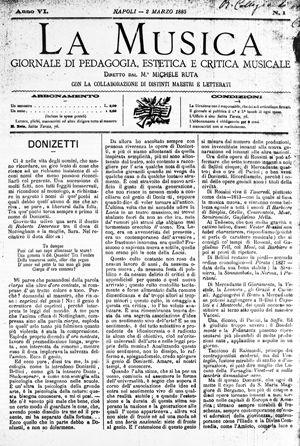La Musica
Prepared by Marina Marino and Marcello Conati
1 volume (1989)

Between 1842 and 1853 four music journals of great importance were established in various cities of the Italian peninsula: in 1842 the Gazzetta musicale di Milano; in 1847 L’Italia musicale (Milan); in 1852 the Gazzetta musicale di Napoli and in 1853 the Gazzetta musicale di Firenze. All four journals were supported by music publishers and each reflected the concerns and point of view of the supporting company. In 1855, 1857, 1876 and 1883 four distinct attempts were made to establish a music journal of significance in Naples independent of the control of a music publisher. Each of these four journals was entitled La Musica.
The third Neapolitan La Musica appeared slightly less than twenty years after the termination of the second. During this period Italy saw radical changes in its political, economic and cultural life. With the second war of independence Italy finally achieved unity under the sovereignty of Vittorio Emanuele II. The new economic order inspired by the legislative principles of the former Piedmont kingdom did not favor the development of the ancient capital of the Kingdom of the Two Sicilies. The influence of Ricordi and Lucca, the powerful Milanese music publishers dictated the rules in the new socioeconomic order. Their influence on musical life was further strengthened by the new law regulating authors’ and publishers’ rights. This law had negative consequences on Neapolitan music publishing, which, during the period immediately preceding unification, functioned in a consistent and autonomous manner. The fourth La Musica is a continuation of the third attempt to establish this journal.
La Musica was founded and directed by the composer and pedagogue Michele Ruta, a teacher at the Naples Conservatory, critic of the Neapolitan Corriere del mattino and an active collaborator of the first La Musica (1855). In this journal one perceives a sort of synthesis in the criteria adopted by each of the two preceding journals. In common with the periodical directed by Trisolini, Ruta’s La Musica contains a series of articles of a pedagogical nature on musical form. A strong link with Staffa’s La Musica is found in the common interest in theoretical and scientific aspects of the musical art. Reviews of operas and concerts continue to be a major factor in this journal. Performances of the mature operas of Verdi including La Forza del destino, Don Carlo, and Aida far outnumber reviews of operas by other Italian composers, while the attention paid to Wagner’s operas, the composer himself and Wagnerism is considerable. There is a marked increase in reviews of published instrumental music and of the concerts of instrumentalists. The activities of the Neapolitan conservatories and conservatories throughout Europe receive considerable attention.
